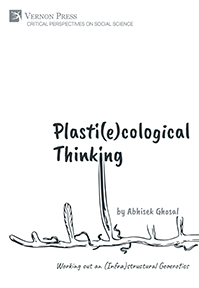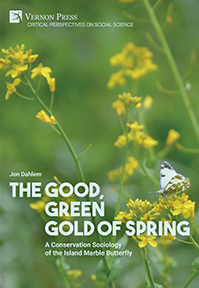Search
Browse
by Publication status
by Subject
Anthropology (26) Art (171) Business and Finance (38) Cognitive Science and Psychology (63) Communication and Journalism (51) Economics (116) Education (71) History (169) Human Geography (23) Interdisciplinary (43) Language and Linguistics (178) Law (16) Music Studies (18) Philosophy (222) Political Science and International Relations (127) Sociology (404) Statistics and Quantitative Methods (21)by Series
Series in Literary Studies (62) Series in Philosophy (57) Series in Education (49) Series in Sociology (42) Series in World History (31) Series in Politics (30) Bridging Languages and Scholarship (26) Series in Language and Linguistics (25) Cognitive Science and Psychology (20) Series in Philosophy of Religion (20) Series in American History (19) Series in Art (19) Critical Perspectives on Social Science (16) Series in Cinema and Culture (16) Curating and Interpreting Culture (15) Series on the History of Art (14) Series in Anthropology (13) Series in Critical Media Studies (13) Economics (13) Series in Business and Finance (12) Series in Music (12) Series in Performing Arts (9) Philosophy of Personalism (8) Series in Communication (8) Series in Law (8) Series in Economic Methodology (7) Series on Climate Change and Society (7) Classics in Economics (6) Series in Economic Development (6) Women's Studies (6) Philosophy of Forgiveness (5) Series in Built Environment (5) Series in Economic History (5) Series in Philosophy of Science (4) Series in Social Equality and Justice (4) Series on the History of Science (4) Serie en Sociología (3) Series in Contemporary History (3) Series in Creative Writing Studies (3) Series in Design (3) The Interdisciplinary Built Environment (3) Series in Heritage Studies (2) Series in Innovation Studies (2) Serie en Ciencias Políticas (1) Serie en Comunicación y Medios (1) Serie en Entorno Construido (1) Serie en Estudios Culturales (1) Serie En Estudios Literarios (1) Serie en Filosofía (1) Serie en Música (1) Series in Classical Studies (1) Series in Economics of Technological Change (1) Series in Philosophy of Race (1) Series in Urban Studies (1)by Language
English Spanishby Author
Browsing with filters

Perspective: Selected Essays on Space in Art and Design
Edited by
Sarina Miller, Temple University
Availability: In stock
250pp. ¦ $85 £70 €80
'Perspective: Selected Essays on Space in Art and Design' explores the ways in which visual and physical space have been designed and experienced in different cultures. This book amplifies the significance of space as a design element by examining its implications in various contexts through a global perspective of art and design.
Staging and Stage Décor: Perspectives on European Theater 1500-1950
Edited by
Bárbara Mujica, Georgetown University
Availability: In stock
309pp. ¦ $93 £76 €87
'Staging and Stage Décor: Perspectives on European Theater 1500-1950' is a compendium of essays by an international array of theater specialists. The Introduction provides an overview of theater décor and architecture from ancient Greece through the Renaissance and beyond, while the articles that follow explore a variety of topics such as the development of lighting techniques in early modern Italy, the staging of convent theater in Portugal, performance spaces at Versailles, the reconstruction of the Globe theater, and Shrovetide plays in Germany. This volume also offers insight into little-studied subjects such as the early productions of Brecht and the spread of Russian theater to Japan. The focus on performance and performance space across centuries and continents makes this a truly unique volume.
Plasti(e)cological Thinking: Working out an (Infra)structural Geoerotics
Abhisek Ghosal, BGR Campus, Bengaluru, India
Availability: In stock
108pp. ¦ $39 £31 €37
This monograph, 'Plasti(e)cological Thinking: Working out an (Infra)structural Geoerotics,' seeks to put forward ‘plasti(e)cological thinking’ as an advanced and ‘new’ epistemic framework which can facilitate readers to think beyond the stratified planetarity that ends up breaking the earth down into territories and strata, blocs and codes, fragments and pieces, ‘sides’ and ‘besides.’ ‘Plasti(e)cological thinking’ is at once grounded in the logics of ‘deterritorialization’ and ‘rhizomatics’ thereby calling the structured and well-thought-out ways of looking into planetary phenomena into question and at times contingent upon the pervasive trajectories of ‘zoe-politics’ which enables it to cut across varied segmentarities on the ‘Plane of Consistency’. Divided into three chapters, this book draws on critical theory, continental thinking, and certain Indian eco-texts to put a spotlight on the nuanced operation of ‘plasti(e)cological thinking’. In a nutshell, this book stands wedded to the production of the ‘new’ and is a contribution to the domain of planetary thinking.
The Good, Green Gold of Spring: A Conservation Sociology of the Island Marble Butterfly
Jon Dahlem, Bellevue University
Availability: In stock
168pp. ¦ $52 £41 €49
This book presents a case study of Island Marble Butterfly (IMB) conservation from an environmental sociological perspective. Using qualitative methods, the study explicates various social components of a collaboration of stakeholders working together to protect the species from extinction. Rediscovered in 1998 after being presumed extinct for nearly a century, the IMB persists exclusively among the San Juan Islands, WA, where the efforts of scientists, local conservationists, government employees, and non-profit organizations have sustained the species, even achieving a listing under the Endangered Species Act. For these reasons and many others, the IMB presents a case in some ways fascinating for its idiosyncrasies and in other ways indicative of broader trends in conservation work in an era of rapid global biodiversity loss. From the study emerges a call for increased sociological research that contributes knowledge beneficial to conservation practice, or what the book calls “conservation sociology.” The book reviews existing literature in this space and provides a framework for constructing research, theory, and application in conservation sociology. As the social components of IMB conservation are explored, so too are components of conservation sociology. The book describes competing norms and beliefs among IMB stakeholders, demonstrating the capacity of conservation sociology to describe and interpret social phenomena in conservation work; explores power dynamics in the collaboration, using sociological theory to interpret significant events in IMB conservation; and analyzes the significance of time in IMB conservation while providing suggestions for applied conservation work based in sociological perspectives. The book accomplishes three main goals. First, it provides an account of details and events in Island Marble Butterfly conservation. Second, it defines, positions, and develops conservation sociology. Third, it demonstrates original research in conservation sociology, resulting in a deep look at the complexities of the social components of species conservation.
Italy and the Ecological Imagination: Ecocritical Theories and Practices
Edited by
Damiano Benvegnù, Dartmouth College
and Matteo Gilebbi, Dartmouth College
Availability: In stock
205pp. ¦ $86 £71 €81
What can Italy teach us about our relationships with the nonhuman world in the current socio-environmental crisis? 'Italy and the Ecological Imagination: Ecocritical Theories and Practices' focuses on how Italian writers, activists, visual artists, and philosophers engage with real and fictional environments and how their engagements reflect, critique, and animate the approach that Italian culture has had toward the physical environment and its ecology since late antiquity. Through a comparative and interdisciplinary approach, the essays collected in this volume explore topics including climate change, environmental justice, animal ethics, and socio-environmental degradation to provide a cogent analysis of how Italian ecological narratives fit within the current transnational debate occurring in the Environmental Humanities. The aim of 'Italy and the Ecological Imagination' is thus to explore non-anthropocentric modes of thinking and interacting with the nonhuman world. The goal is to provide accounts of how Italian historical records have potentially shaped our environmental imagination and how contemporary Italian authors are developing approaches beyond humanism in order to raise questions about the role of humans in a possible (or potentially) post-natural world. Ultimately, the volume will offer a critical map of Italian contributions to our contemporary investigation of the relationships between human and nonhuman habitats and communities.






